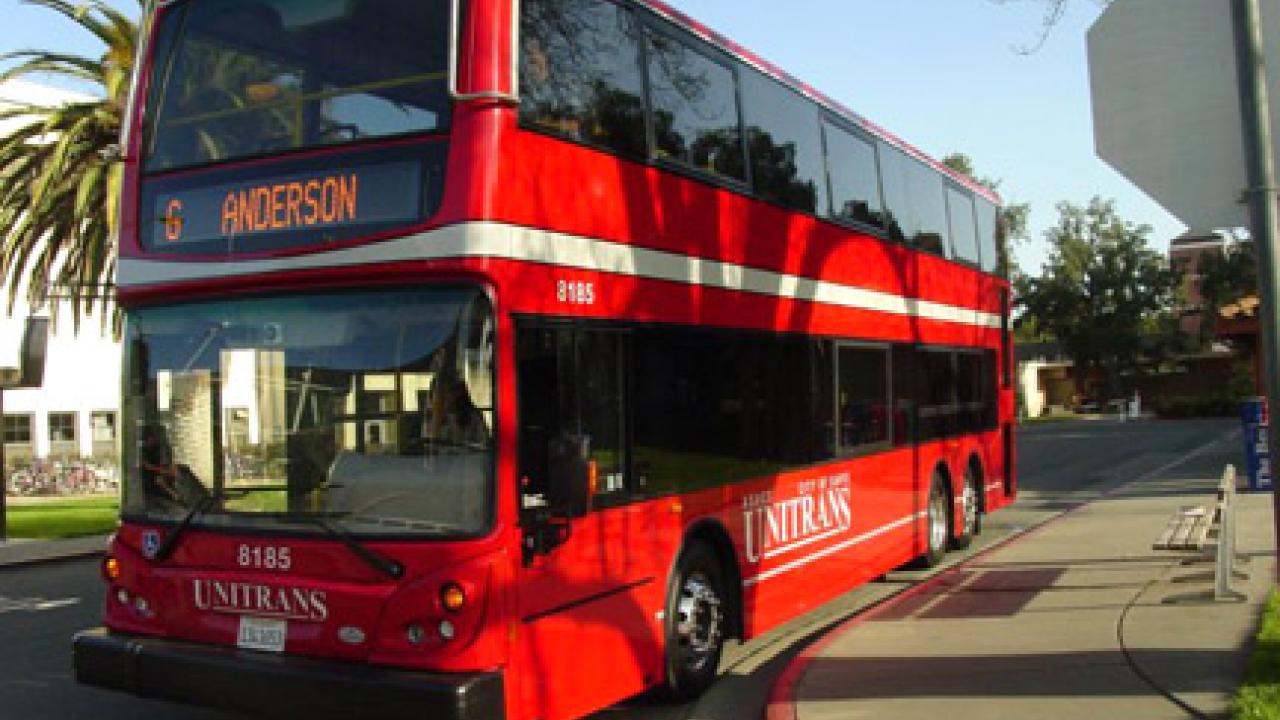Unitrans will forever be known for the London double-deckers that the ASUCD purchased and brought here from London in 1968 to start a bus system.
Over the years, Unitrans added 10 more of the vintage double-deckers — along with dozens of modern, single-deck buses to carry an ever-increasing number of passengers — in excess of 3.5 million in 2009-10 — on a system in which the city of Davis is now a partner with the ASUCD.
And while four of the London double-deckers are still in service, Unitrans this year purchased two brand-new double-deckers —shiny, sleek and modern in every way, with wheelchair access and air conditioning (amenities you will not find on the old buses).
The new buses, each costing $813,000, including tax, went into service in the spring (including Picnic Day), and are due back in the fall when school resumes. (Unitrans' 2010-11 schedule, set to take effect Aug. 2, includes regular Sunday service for the first time, starting Aug. 8.)
“Riders love the comfort of the new buses and the large windows,” said Anthony Palmere, assistant general manager of Unitrans. “They are also much easier to drive.”
For one thing, they are left-hand drive, compared with the right-hand drive (British-style) in the vintage buses.
The new buses are slightly shorter in height (14 feet), but they are wider and longer (8½ feet by 40 feet), the same as a single-deck bus. Each double-decker has 81 seats (double the number on a single-deck bus), with standing room for 20 or more people.
The vintage buses carry 64 people. When exiting from the front or rear, they step off into the street (remember, these buses are from England, where people drive on the other side of the road).
As a safety precaution, a conductor rides at the back of each vintage double-decker — and acts as a flagger when people are exiting the bus into the street.
Exits lead onto the curb, not the street
The new double-deckers have curbside exits at the front and rear. Nevertheless, Unitrans is putting a conductor on each of the new buses. “The conductor is there for consistency in scheduling our staff — since a vintage bus could be substituted at the last minute — and to allow for faster boarding through both the front and rear doors,” Palmere said.
As much as people may like the comfort of the new buses, and even with their improved drivability and safety, Palmere said, “they do not have the friendly and iconic look of the vintage buses.”
The Unitrans double-deckers are Regent models, which became available when London started switching to Routemasters in the 1960s. By 2005, London had replaced all of its Routemasters with modern double-deckers, Palmere said. “But people missed the old buses, and they were eventually brought back to run on Heritage Routes.”
There is no need for Heritage Routes in Davis, as you will still see the old buses when school is in session, primarily on these two high-volume lines:
• E — downtown, F and J streets
• F — Oak Avenue, Alvarado Avenue (east) and Catalina Drive
The new double-deckers will run on these high-volume routes:
• B line — Wake Forest Drive, Sycamore Lane and Drake Drive
• G line — Anderson Road, Alvarado Avenue (west) and Sycamore Lane (north)
Career, student mechanics keep the Regents going
The 2010 double-deckers are Enviro500 models from Alexander Dennis Ltd. in the United Kingdom, with final assembly in Riverside. They run on clean diesel (there is no room for compressed natural gas tanks on top of the buses or under the buses).
Palmere said Unitrans plans to keep its 1948, 1952 and 1954 double-deckers in service; two of these run on clean diesel, the other on compressed natural gas. Unitrans expects to retire the 1950 bus at the end of this year, Palmere said.
He credited career and student mechanics with keeping the Regent buses in regular service for more than 40 years — twice as long as they ran in London.
Media Resources
Dave Jones, Dateline, 530-752-6556, dljones@ucdavis.edu
